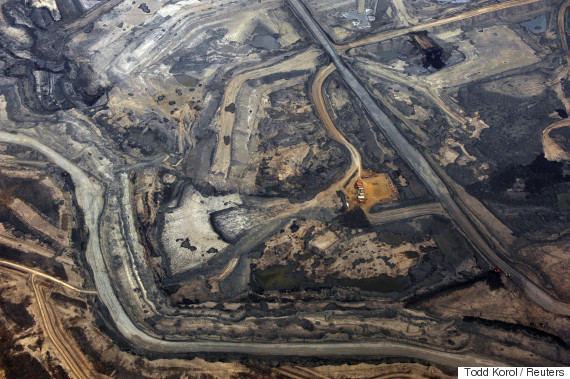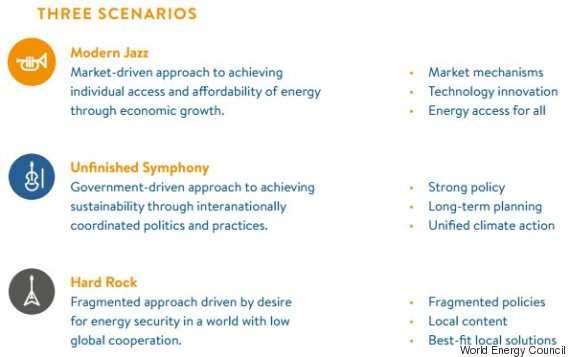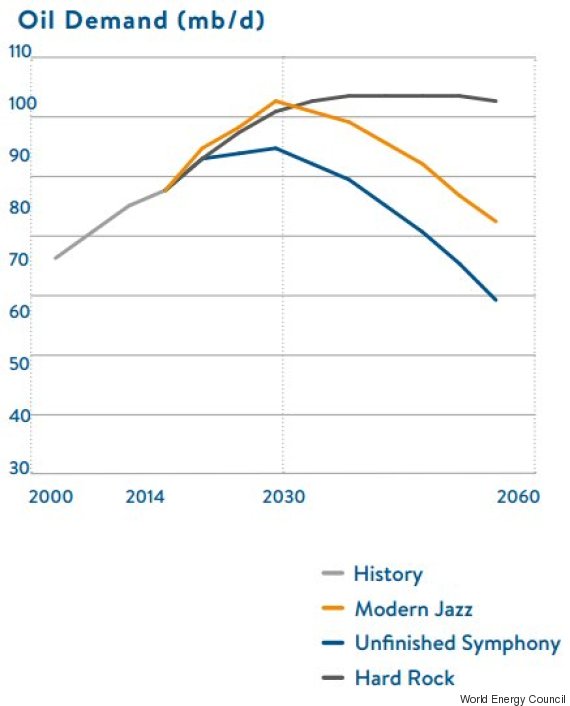Page added on October 19, 2016
Peak Oil Demand Could Hit In 2030. Or Sometime Between 2040 And 2050

The past two years have been tough for energy companies and resource-dependent economies.
The price of oil has plummeted from about $100 per barrel to around $30, and only recovered to $50 in recent weeks amid news that OPEC would cap production.
An oil price recovery was welcome news for the oil industry, as analysts still expect Canadian production to grow by 28 per cent up to 2030.
But demand for oil could peak in that time, says a new report from the World Energy Council (WEC). So where does that leave energy-dependent economies like Alberta?

The Syncrude oilsands mine north of Fort McMurray, Alta. on Nov. 3, 2011. (Photo: Todd Korol/Reuters)
The WEC report, titled “The Grand Transition,” outlines three scenarios for the future of energy around the world.
In one scenario, titled “Modern Jazz,” energy leaders will find themselves in a market-driven world where resource affordability will be achieved through economic growth.
Another scenario, “Unfinished Symphony,” sees a government-driven approach to sustainability using “strong policy, long-term planning and unified climate action.”
A final scenario, “Hard Rock,” is characterized by a “fragmented approach driven by desire for energy security in a world with low global cooperation.”

Global oil demand is currently estimated at around 97 million barrels per day, according to the International Energy Agency (IEA).
Such demand would peak at 103 million barrels per day in the “Modern Jazz” scenario, and at 94 million barrels per day in “Unfinished Symphony.” This would largely happen due to new technologies for transport fuel, as well as competition from alternative forms of energy.
Oil demand would peak later under the “Hard Rock” scenario, reaching about 104 million barrels per day sometime between 2040 and 2050. In this scenario, transport systems would largely operate as they do right now.
You might say the world is set to reach “Peak Oil,” though it means something different from what it used to.

This isn’t the first report to suggest that demand for oil will level off in the coming decades.
Earlier this year, Bernstein Research released a report that also identified 2030 as the peak year for oil demand, after which the desire for the resource will start dropping.
It said fuel efficiency and alternative energy would sap out demand for the resource.
Bold #oil prediction from Bernstein Research showing demand peaking around 2030-2035. pic.twitter.com/205gBjLDEE
— Alex McGuire (@AlexMcGuire92) April 25, 2016
The province’s economy isn’t solely dependent on energy, University of Alberta economist Trevor Tombe noted earlier this year.
In a January op-ed for CBC News, he said that seven per cent of Alberta’s workforce is employed in oil, gas and mining. That’s less than the eight per cent of Ontario workers employed in finance, insurance and real estate.
Construction, he noted, also employs a significant portion of Alberta’s workers.
Agriculture has also shown strength amid the downturn, particularly in the cattle industry, which is thriving despite low beef prices, according to BMO.
Tombe stopped short of saying exactly what should be done. But clearly an economy like Alberta’s can’t just sit and hope for oil prices to go back to what they were.
4 Comments on "Peak Oil Demand Could Hit In 2030. Or Sometime Between 2040 And 2050"


penury on Wed, 19th Oct 2016 9:18 am
Really 2030? They are so good at predicting I am impressed. I recommend HuffPost for all things imaginenary and truthless.
Ghung on Wed, 19th Oct 2016 9:22 am
“In one scenario, titled “Modern Jazz,” energy leaders will find themselves in a market-driven world where resource affordability will be achieved through economic growth.
Another scenario, “Unfinished Symphony,” sees a government-driven approach to sustainability using “strong policy, long-term planning and unified climate action.”
A final scenario, “Hard Rock,” is characterized by a “fragmented approach driven by desire for energy security in a world with low global cooperation.””
None of the above?
Typically, there’s no scenario for limits to growth and economic contraction. It’s utterly inconceivable that human progress and economic growth can’t continue in some form.
Kenz300 on Wed, 19th Oct 2016 12:08 pm
Climate Change is real..
The world is moving away from fossil fuels.
We have to.
Mark Ziegler on Thu, 20th Oct 2016 3:05 pm
Another way of stating peak oil demand is calling it permanent recession and depression.